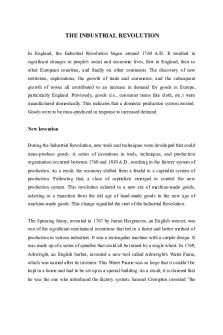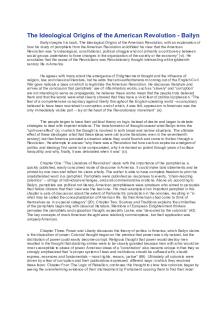Effects of the Sugar REvolution PDF

| Title | Effects of the Sugar REvolution |
|---|---|
| Author | Cherish Holmes |
| Course | US History |
| Institution | Houston Community College |
| Pages | 4 |
| File Size | 127.9 KB |
| File Type | |
| Total Downloads | 96 |
| Total Views | 217 |
Summary
Download Effects of the Sugar REvolution PDF
Description
The Economic Effect The change from the cultivation of tobacco to sugar profoundly modified agriculture in the British West Indies, the society became one of monoculture (the cultivation of a single crop in a given area). Among the changes were adjustments for the economic lives of the tobacco farmers, a change in the economic conditions produced a corresponding change in the labor supply. Sugar required large plots of land and hordes of cheap labor. The rise of the sugar industry was the signal for the dispossession of small farmers. There were still a few farmers who made a living off tobacco but when islands changed to sugar the price of tobacco fell and 10 acres of land was no longer enough to ensure a reasonable livelihood. Therefore, contributing to the reduction in the white population on the islands as many of them returned to England after losing their plantations. There was a complete dependence on sugar and the introduction of the navigational laws by the European Countries; this was due to decrease in the demand for tobacco. There was a change is the ways of the agricultural economy from diversified to monoculture. Tobacco was produced on relatively small plots. These plots were much too small to cultivate sugar; hence, larger estates were acquired. As sugar became more profitable and the demand for land increased so did the price of land. Capitals were invested in the sugar industry. Most of the capital however came from the Mother Country itself. Soon the West Indian planters became indebted to European bankers, investors and merchants. However, plantation owners became wealthy. Some of them went back to Europe to live luxuriously, showing off their wealth. The expression “as rich as a West Indian
1
planter” was deemed a suitable description of any wealthy person. Also, from the high profits earned the Sugar revolution paved the way for the Industrial Revolution.
The Social Effect
One of the major implications of the sugar revolution was the introduction of a great number of African slaves. Soon blacks far outnumbered whites, in some cases the ratio was as much as 25:1. In nearly every case the white section of the population declined, as smallholders and indentured servants were replaced by a relatively small number of wealthy landowners. At the same time, as these landowners imported more Africans to form a labour force the black population increased. During the eighteenth century each slave society in the colonies had a group called the “free people of colour”. This group originated from the sexual relations between the masters and slaves. By the nineteenth century, they group could be divided in blacks that had gained freedom and mulattos, those that were descendants of Europeans and slaves. This changed ethnic composition led to a changed social system causing the emergence of different social classes. The introduction of so many blacks to the British West Indies shaped the character of both the blacks and whites, now the social status was dominated by color. There was a suppression of blacks by a repressive legislation, at the top were the whites, in the middle were the mixed race and the free Africans and at the bottom were the enslaved Africans. However, among theses group smaller groups were formed: among the whites for example status was largely determined by occupation and or wealth. At the top, forming an elite, were families who owned slaves and successful plantations. Next in rank came the merchants, officials, and such professionals as doctors and clergymen, who were just a shade below the big planters. At 2
the bottom of the white ranks came the so-called “poor whites,” often given such pejorative names as “red legs” or “walking buckras”. This group included small independent farmers, servants, day laborers, and all the service individuals from policemen to blacksmiths. Absenteeism was a new factor brought about by the sugar revolution. This refers to plantation owners living away from the plantations in Europe and hiring a manger called an attorney to stay on the island and take charge. Many rich planters were able to return to England, set up residence there, and live off proceeds of their West Indian estates. This was as a result of a number of factors some pulling them back to England, like family and others pushing them, like the climate.
The Political Effects The cultivation of sugar increased the wealth obtained from the British West Indies. This resulted in a change in the system of governing the colonies. From their control a show there was a show of financial gain therefore, bringing the island under more direct control. The Islands were reviewed highly by the Metropolitan countries and became pawns whenever treaties were agreed. Laws such as the Navigational Acts (designed to regular colonial trade and enable England to collect taxes in the colonies) and the Mercantile System (a system of managing the economics of a country through the regulation of its foreign trade) were instituted to a better control of the of the colonies. The whites often used their political power, or in some cases their access to political power in Britain, to circumscribe the free blacks as much as possible. Laws distinguishing
3
comportment, dress, and residence, denying blacks the right to practice certain professions, or limiting the material legacy of individual free black. The franchise (right to vote) was granted only to those who owned a certain amount of land. The whites were the only ones then with the right to vote and they ultimately controlled the House of Assembly.
Books:
Auger, F.R, Gordon, S.C, Hall, D.G & Reckord, M.(1960) The Making of the West Indies, Longman Caribbean Trinidad
Claypole,W. & Robottom J.(2001) Caribbean Story Book 1.
Greenwood, R & Hamber, S.(2003) Amerindians To Africans Book 1
Williams, Eric. (1944) Capitalism& Slavery, Ian Randle Publishers Kingston
Websites:
http://countrystudies.us/caribbean-islands/8.htm
http://www.scrib.com/doc/51122465/The-Sugar-Revolution#
http://www.studymode.com/essays/Sugar-Revolution-477398.html
http://blablawriting.com/the-sugar-revolution-essay
http://missmango.wikispaces.com/9+a.+The+Sugar+Revolution
http://caribbean.notesmaster.com/notes/syllabus/viewer/816-the-effects-of-slavery-onother-areas-of-caribbean-life
4...
Similar Free PDFs

Effects of the Sugar REvolution
- 4 Pages

THE EFFECTS OF CORRUPTION
- 5 Pages

Sugar and sugar products doc
- 9 Pages

THE Industrial Revolution
- 4 Pages

The American Revolution summary
- 5 Pages
Popular Institutions
- Tinajero National High School - Annex
- Politeknik Caltex Riau
- Yokohama City University
- SGT University
- University of Al-Qadisiyah
- Divine Word College of Vigan
- Techniek College Rotterdam
- Universidade de Santiago
- Universiti Teknologi MARA Cawangan Johor Kampus Pasir Gudang
- Poltekkes Kemenkes Yogyakarta
- Baguio City National High School
- Colegio san marcos
- preparatoria uno
- Centro de Bachillerato Tecnológico Industrial y de Servicios No. 107
- Dalian Maritime University
- Quang Trung Secondary School
- Colegio Tecnológico en Informática
- Corporación Regional de Educación Superior
- Grupo CEDVA
- Dar Al Uloom University
- Centro de Estudios Preuniversitarios de la Universidad Nacional de Ingeniería
- 上智大学
- Aakash International School, Nuna Majara
- San Felipe Neri Catholic School
- Kang Chiao International School - New Taipei City
- Misamis Occidental National High School
- Institución Educativa Escuela Normal Juan Ladrilleros
- Kolehiyo ng Pantukan
- Batanes State College
- Instituto Continental
- Sekolah Menengah Kejuruan Kesehatan Kaltara (Tarakan)
- Colegio de La Inmaculada Concepcion - Cebu










